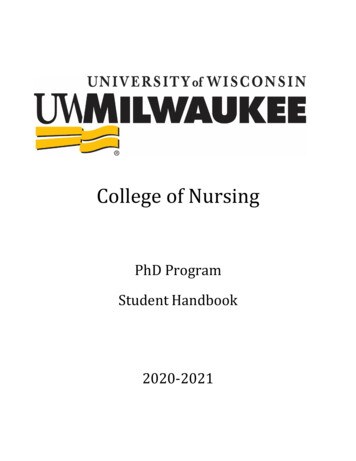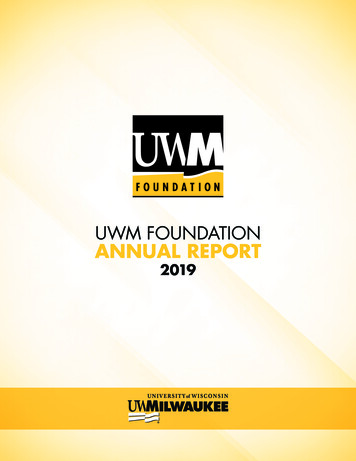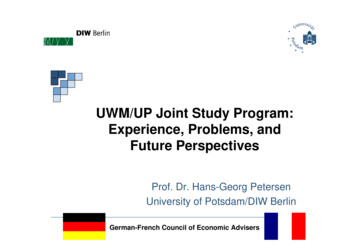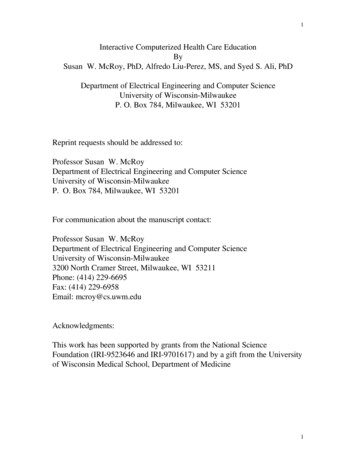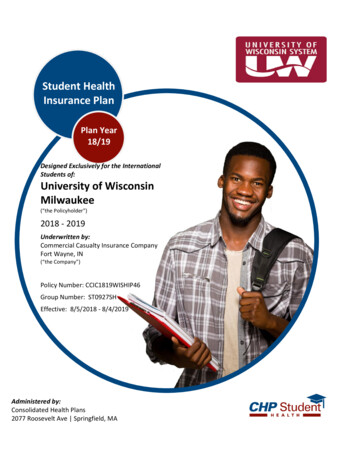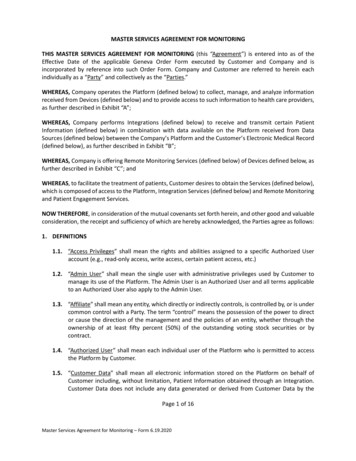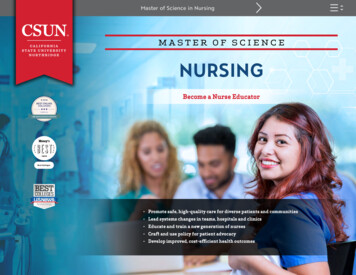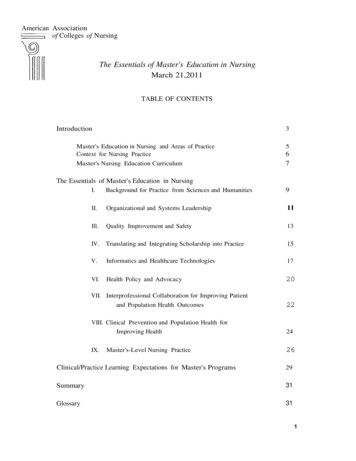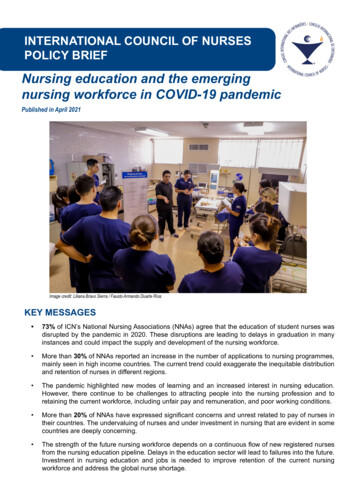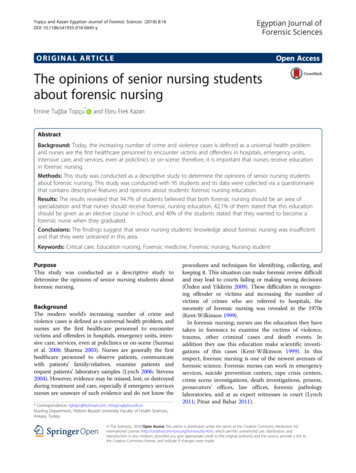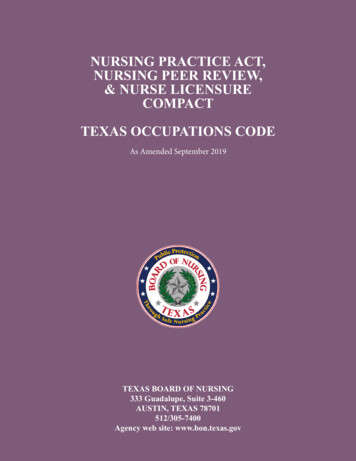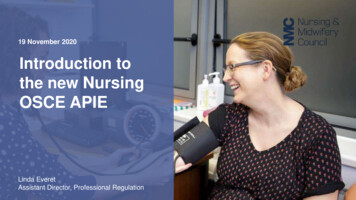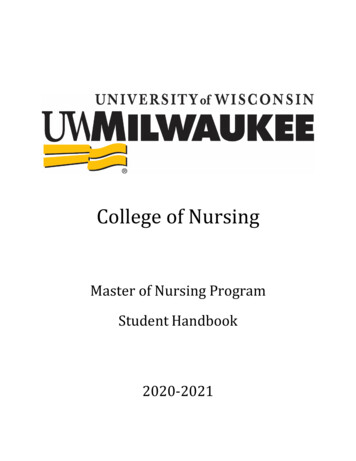
Transcription
College of NursingMaster of Nursing ProgramStudent Handbook2020-2021
UWM CON MN Student Handbook – 2020-2021COVID-19 Information for Students – UWM College of NursingThe following guidelines are intended for students enrolled in academic programs offeredwithin the College of Nursing. The safety of students and faculty within the College of Nursing isof the highest priority. Given that many of our students are also essential workers, everypossible precaution will be taken to allow students and faculty to be as safe as possible whilealso providing the highest quality educational experience.The UWM Emergency Operations Center Report is the main source of these guidelines. Thisreport can be accessed here: er-Report Final.pdfThese guidelines are categorized as:1) General guidelines,2) Guidelines when inside Cunningham (UW-Milwaukee) or Tallent Halls (UW-Parkside), and3) Guidelines when in class at off campus sites such as community agencies, schools, andhealth care facilities.General Guidelines Wash hands with soap and water for at least 20 seconds. Keep a supply of hand sanitizer. Do not touch your eyes, nose, or mouth with unwashed hands. Wear a covering to cover both the mouth and nose when indoors and anytime 6 feet ofdistance cannot be maintained. Cover your cough or sneeze. Clean all high touch areas at home and school. Avoid crowded areas. Keep six feet of distance between yourself and others. Ask yourself the screening questions before going to class on campus or into clinical andcommunity settings.COVID-19 Screening Questions People with COVID-19 have had a wide range of symptoms reported – ranging frommild symptoms to severe illness. Symptoms may appear 2-14 days after exposure tothe virus. Have you had these symptoms in this past timeframe?Yes No Symptom/ExposureFever or chills (100.4 F or greater)CoughShortness of breath or difficulty breathingFatigueMuscle or body achesHeadache
UWM CON MN Student Handbook – 2020-2021New loss of taste or smellSore throatCongestion or runny noseNausea or vomitingDiarrheaHave you been in close contact with others throughwork, home or the community who have testedpositive for COVID-19?(CDC, 2020) UWM students who have concerns about symptoms or potential exposure areencouraged to call Norris Health Center at (414) 229-4716 to speak with a medicalprofessional who can provide additional guidance. https://uwm.edu/norris/healthservices/Nursing students taking courses at UW-Parkside with concerns about symptoms orpotential exposure are encouraged to call UWP Student Health and CounselingCenter (262)595-2366 to speak with a medical enthealth/Communicate COVID-19 exposure or illness to your instructors as soon as possible.Instructors will work with the Program Director to develop a plan with the student.Stay home if you are sick.Guidelines When Inside Cunningham Hall The covering of the mouth and nose (such as a cloth mask) is required within CunninghamHall.o A mask may be removed when an individual is alone in their own office. It is extremely important, for infection control, that students not wear to campus clothingthat was worn in hospital or other health care setting where direct patient care isprovided.o Students who wear scrubs or white coats to campus are responsible for ensuringthey are clean before arriving to campus. If you are unable to clean scrubs or whitecoats prior to coming to class, please change into clean street clothing beforecoming to campus. Talk to your advisor about any concerns. Students will be provided, are required to wear, personal protective equipment (PPE)when attending classes where social distance cannot be maintained (e.g., healthassessment labs, psychomotor skills). Students and staff will monitor the flow of traffic to maintain six feet of distance whenentering and exiting rooms.
UWM CON MN Student Handbook – 2020-2021The College of Nursing has a “if you touch it, you clean it" policy during simulations andskills in the College of Nursing. This is an important teachable activity for nursing studentsto understand potential transmission, infection control and prevention.Guidelines When in Class at Off Campus Sites Students will adhere to facility and unit specific requirements for symptom screening andPPE use. Students will follow any facility-based travel restrictions related to COVID-19.Noncompliance will result in consequences including being denied entry to class, clinical, andimplementation of the Professional Expectations of Students in Academic and Clinical Settingspolicy (CP 05-01-17B) Please note that these guidelines are subject to changes as new information becomes availableto remain aligned with federal, state, and local public health recommendations. Students willbe notified directly of changes.
UWM CON MN Student Handbook – 2020-2021Table of ContentsGeneral InformationGreetings from the Program DirectorPhilosophy of the College of NursingVision, Mission, Core Values & Guiding Principles StatementCollege of Nursing Organizational ChartsMasters Program InformationConceptual FrameworkStatement of Objectives of the Pre-Licensure Curriculum in NursingStatement of the Objectives of the Master of Nursing ProgramAdmissions RequirementsMN Course ListMN-DNP ProcedureDEM-MN Curriculum-Plan of StudyPost-BS MN Full Time Plan of StudyPost-BS MN Part Time Plan of StudyGuidelines for Residency ProjectPolicies and ProceduresProgressionGrading ScaleAcademic ExpectationsSummary of University of Wisconsin-Milwaukee PoliciesAcademic Policies and InformationTechnology Use and Electronic Media PolicyResourcesExpectations of Students in the Nursing ProgramSummary of Immunization Requirements and PoliciesAdditional Safety InformationCollege of Nursing Academic PoliciesStudent Uniform and Dress CodeGraduation ProceduresStudent Support ServicesUWM Graduate Student ResourcesCampus ResourcesDirectory of Resources for WritingStudent Participation in CON GovernanceGraduate Nursing Students – Using UWM 3738394142
UWM CON MN Student Handbook – 2020-2021Nursing Learning Resource Center (NLRC)Master Student Scholarship and Financial AssistancePolicy for Graduate Student Utilization of Werley CenterStudent Responsibilities434446NCLEX-RNSafe Professional Practice in Clinical SettingsHealth Insurance Portability and Accountability Act (HIPPA)Invasive ProceduresGuidelines for HIV/AIDSStandards of Professional ConductProtocol for Percutaneous ExposureAppendix47485152525354MN Advising Plan – BSN-MN Part-timeGraduate Program Request for Exception (RFE) FormGuidelines, Application, Agreement & study forms for Independent StudyPolicies565860Background Checks Policy (CP 02-01-19)64666983Classroom and Clinical Policies (CP 05-02-17A)Graduate Appeals & Exception Policy (GPC 05-05-17A)Professional Expectations of Students (CP 05-01-17B)This handbook includes pertinent information important to your progression in the professional major.
UWM CON MN Student Handbook – 2020-2021Introduction: Message from the MN Program DirectorCongratulations and welcome to the Master of Nursing (MN) program atthe University of Wisconsin-Milwaukee College of Nursing. For many of you,beginning this program represents a major change in your life and/orcareer. We are especially pleased that you chose to pursue your graduateeducation with us.You will be prepared to promote safe, high quality health care in a variety of settings, withinthe role of Clinical Nurse Leader. Your courses will provide you with opportunities to developskills in collaboration, critical thinking, cultural competence, independent and interdependentleadership, research utilization, education, and clinical practice. You also will becomeknowledgeable about ethical, legal, and public policy issues that impact health care. Uponcompletion of the program, you will be ready to function independently and collaboratively atthe microsystems level to provide care for individuals, families, and populations.We anticipate that your graduate student experience will be transformative and includeopportunities for both personal and professional growth. Faculty members value your previouseducational and professional experiences. We are committed to facilitating your success.Nursing, and all of healthcare, depends on teamwork and great communication skills. Yournursing program is a great time to start to develop a strong nursing network. Get to knowyour academic advisor and your course faculty. They have a wealth of knowledge andexperience to exchange with you.Also take time to get to know your classmates. They are traveling this educational road withyou and can provide support, encouragement, and friendship from a shared perspective.Furthermore, please know, as Program Director, I am committed to your success. I have anopen-door policy so please feel free to stop in and talk to me about questions, concerns, forsupport, or just a friendly chat.This handbook has been designed to orient you to important information about your graduatestudent experience. Take time to read through the handbook and become familiar with it. Feelfree to ask me or your advisor should you have questions. This handbook has copies of requiredforms that you will complete at various points during your program, along with procedures andpolicies to which you may need to refer.We know that your time with us will be exciting and full of excellent learning andexperiences. Please feel free to contact me should you have any questions.Paula Lucey, PhD, RN, CNLClinical Assistant ProfessorMN Program Director1
UWM CON MN Student Handbook – 2020-2021Philosophy of the College of NursingConsistent with and evolving from the core values the following principles about human beings,environment, health, nursing, learning, and teaching guide the educational programs of theUniversity of Wisconsin- Milwaukee College of Nursing (UWM-Milwaukee, CON).Professional nurses are educated at a variety of curricular levels for generation, application, andevaluation of knowledge. The teaching-learning process is interactive. Learning requires activestudent participation and is enhanced when the instructional environment is respectful andsupports personal worth, dignity and self- identity in the teacher and the student andencourages each person to grow and discover meaning.Each human is a unique, dynamic, integral being. Human beings exist within physical and socialenvironments. These environments are shaped by dynamic events in socio-cultural, natural,local and global political milieus. Actions of individuals and groups also shape theseenvironments that provide the context within which health and nursing systems operate.Nursing is committed to social justice, challenges existing paradigms when appropriate andcreates innovative solutions for health care problems.Nursing is a socially derived profession whose members assist person, families, groups and thelarger society to pursue the goal of optimum health. Health is a dynamic state influenced by theconstant interaction of internal and external factors. Health status is reflective of the well-beingof individuals and aggregates within environments and encompasses wellness, risks, problems,and needs that may be or have the potential to be present.Through the use of the nursing process, dynamic interactions between the nurse and the clientfacilitate the promotion, maintenance, or restoration of health. The knowledge base of nursingmust be continually developed and evaluated in response to changing environmental healthneeds. Nursing care is guided by professional standards and requires personal and professionalintegrity.Nursing, as a human interaction, is most effective when nurses reflect the population that itserves. The CON seeks to admit and educate a diverse student body in order to enrich thestudents’ educational experience and to prepare them to meet the health needs of a diversesociety. Therefore, a holistic review of applicants to the CON includes an evaluation ofacademic achievement, work and leadership experiences, personal and professionalaccomplishments, skills, abilities and personal qualities. Consideration of these factors aswell as a wide range of economic, social, racial/ethnic and geographic backgrounds willenhance diversity within the CON and the nursing profession.Fac Doc #(87-04)093ASchool of Nursing Faculty approved Faculty Document # (87-04)093 on April 3, 1987; 09/13/02 (ed.) CON Facultyapproved Faculty Document #(87-04)083A on November 17, 2006.2
UWM CON MN Student Handbook – 2020-2021Vision, Mission, Core Values and Guiding PrinciplesVision StatementAs an innovative, academic, nursing community, the University of Wisconsin-Milwaukee Collegeof Nursing faculty, staff, students, and alumni are renowned leaders in creating bold andeffective solutions for advancing local, national and global health.Core tyCreativityHuman DignityDiversitySocial JusticeWe, the University of Wisconsin-Milwaukee College of Nursing community, embrace anddemonstrate these core values in our learning, teaching, research, practice, and serviceGuiding PrinciplesAs a diverse Community of Scholars that values passionate, academic discourse and debate in aclimate of civility, we live our core values and create opportunities to embrace, welcome,respect, and strive to understand the perspectives of others – colleagues, students,patients/clients, and community partners. As a CON community, we: live our core values;exhibit respectful, transparent and clear communication;expect and embrace shared accountability;appreciate and foster innovation; andseek collaboration in teaching, research, practice and service.Mission StatementThe University of Wisconsin-Milwaukee College of Nursing is a premier, urban,academic, collegial, nursing community that acts collaboratively with partners to: Prepare a diverse population of students to become science based,compassionate, nurse leaders through innovative, quality, educational programsfor all settings and levels of practice;Conduct research and scholarship that advance science in nursing and health;Address emerging health needs through evidence based practice andconsultation; and Develop leaders who transform health care deliveryand health policyFaculty Document # (96-09) 100B3
University of Wisconsin–Milwaukee College of NursingOrganizational Chart for 2020-2021Associate Dean forAcademic AffairsJennifer DoeringSecretaryAcademic Affairs Support StaffSusan Wolff (Admin Prog Specialist)Christopher Peters (Admin Prog Specialist)Kristen Swanson (Preceptor Coordinator)Raymond MacDonald (Sr Admin Specialist)Sonya Sharp (Univ Services Prog Assoc)Educational Design & TechnologySupportmLaura Bennett (Information Processing Consultant)Data ArchitectAmber DuChateau (Assoc Information Processing Consultant)Brian Lang (Information ProcessingConsultant)Student AffairsConsortial NursingProgramsNursing ProgramsNursing LearningResource Center(NLRC)4
University of Wisconsin–Milwaukee College of NursingOrganizational Chart for 2020-2021Nursing ProgramsUndergraduate ProgramsMelissa Brown (Clin Asst Prof) - UG Program Director (Interim)Nicole Simonson (Clin Instr)- Director of RN-BSN CompletionPrograms (Interim)Graduate ProgramsPaula Lucey (Clin Asst Prof) - MN Program DirectorLynne Woehrle (Assoc Prof) - MSP Program DirectorCarol Klingbeil (Clin Assoc Prof) - DNP Program DirectorJulia Snethen (Prof) - PhD Program DirectorUndergraduateProgram SupportAmy Amherdt (Sr Admin Specialist)BSN@Home:Sylvia Forbes (Outreach Program Manager II)Undergraduate ProgramCoordinatorsLisa Brennan (Clin Instr) - Curriculum (interm)Kylateia Farrar (Clin Instr) - NCLEXDeanna Harcarik (Clin Instr) - CurriculumDanielle Krueger (Clin Instr) - NCLEXJennifer McCulloch (Clin Instr) - Curriculum (interim)Mandy Sheriff (Clinical Asst Prof) - CurriculumGraduate ProgramSupportSue Wolff (Admin Prog Specialist) Support for MN, DNP & PhD Program DirectorsBridget Brown (Admin Prog Specialist) Program Coordinator for MSP ProgramLaura Hermanns (Admin Prog Specialist) Support for MSP ProgramBarb Zembles (Clin Instr) - Curriculum (interim)5
University of Wisconsin–Milwaukee College of NursingOrganizational Chart for 2020-2021Student AffairsRobin Jens - Assistant Dean of Student ServicesStudent Affairs Support StaffMichael Walk (Admin. Specialist) Office Manager-Lynn Helmke (University Services Assoc. II)Receptionist/Admin. SupportMatthew Halloran (Advisor) Recruitment CoordinatorAdvisorsBridget Brown (Admin. Prog. Specialist - MSP)Jennifer Daood (Sr. Advisor)Sylvia Forbes (Outreach Prog. Manager II)Nursing Study CenterEbony Cobb (Advisor) - CoordinatorTamara Griffin (Faculty Associate) Learning Specialist/TutorKatie Nack (Advisor)Connor Sampson (Advisor - Pre-Nurisng, MATC)Hillary Vara (Advisor - UWP)Donna Wier (Sr. Advisor)6
UWM CON MN Student Handbook – 2020-2021Master of Nursing ProgramI.Conceptual FrameworkThe advanced generalist Master of Nursing program at the University of WisconsinMilwaukee prepares graduates for advanced generalist nursing practice in culturallydiverse urban communities at the point of care. The program educates clinical nurseleaders who can function independently and collaboratively at the microsystems level toprovide care for individuals, families, and populations within the context of evidencebased health care in all settings.The advanced generalist curriculum builds on the entry-level generalist foundation ofnursing established in the pre-licensure curriculum and provides the groundwork foradvanced generalist practice upon which content specific to clinical nurse leadership isbuilt. It also encourages the direct entry student to utilize skills and knowledge broughtforth from previous life experiences, professional opportunities and academic degrees assupplements to their nursing development. Important priorities in the program are thedevelopment of critical thinkers who can communicate effectively with others as theygather and analyze data and determine solutions to clinical problems; examine the impactof information, frameworks, theories, problems, and issues in nursing and health care;and function effectively in ever changing roles consistent with the evolving health caresystem. The program prepares graduates for leadership in promoting quality, evidencebased care and collaboration with the interprofessional healthcare team at themicrosystem level.To accomplish this, the program prepares graduates to apply principles of qualityassessment and improvement, identification of appropriate evidence, managing change inpractice, outcomes evaluation, use information and healthcare technology, and advocateto address health care needs for the 21st century. Through an integrated curriculum thataddresses the theoretical foundations and evidence-base of nursing practice; organizationof healthcare systems, ethics; human diversity and social issues; health promotion anddisease prevention; healthcare policy; and professional role development, the UWMmaster’s graduate is well prepared to provide quality advanced generalist nursing careand effective leadership for diverse populations and workforces in rapidly changinghealthcare systems.The faculty has adapted a transformational approach to education. The transformationalapproach has three strategies: honoring and respecting the past, coaching students tosuccess and transformational leadership. The faculty appreciates that students have agoal of changing career paths and shares that vision with the students. To achieve thisambitious vision, the faculty will expect integrity, self-motivation, engagement,accountability and respect for faculty, peers, staff and patients. From the faculty,students can expect expertise,
Nursing, and all of healthcare, depends on teamwork and great communication skills. Your nursing program is a great time to start to develop a strong nursing network. Get to know your academic advisor and your course faculty. They have a
